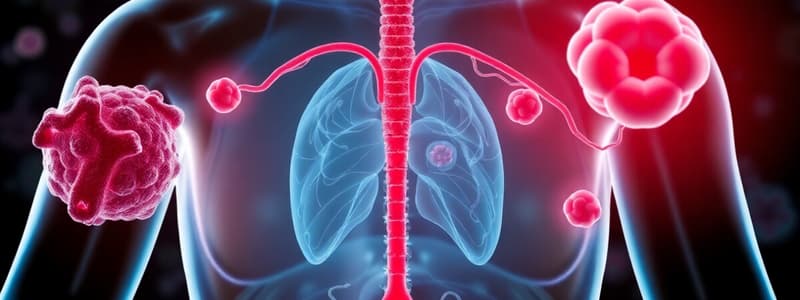Podcast
Questions and Answers
What is the primary function of the Islets of Langerhans in the pancreas?
What is the primary function of the Islets of Langerhans in the pancreas?
- Production of insulin and glucagon (correct)
- Synthesis of estrogen and progesterone
- Secretion of growth hormone
- Regulation of blood calcium levels
Which feedback mechanism is most common in hormone regulation?
Which feedback mechanism is most common in hormone regulation?
- Negative feedback loop (correct)
- Cyclic feedback loop
- Open feedback loop
- Positive feedback loop
Which of the following disorders is primarily associated with abnormal insulin production?
Which of the following disorders is primarily associated with abnormal insulin production?
- Hyperthyroidism
- Hypothyroidism
- Diabetes (correct)
- Acromegaly
Which factor is NOT known to affect hormone secretion?
Which factor is NOT known to affect hormone secretion?
What type of chemical messenger acts faster than hormones?
What type of chemical messenger acts faster than hormones?
What role do hormones play in organisms?
What role do hormones play in organisms?
Which hormone is an example of a steroid hormone?
Which hormone is an example of a steroid hormone?
What distinguishes non-steroidal hormones from steroid hormones?
What distinguishes non-steroidal hormones from steroid hormones?
Which gland is known as the master gland of the endocrine system?
Which gland is known as the master gland of the endocrine system?
What is the primary effect of the thyroid gland?
What is the primary effect of the thyroid gland?
What type of receptors do steroid hormones typically bind to?
What type of receptors do steroid hormones typically bind to?
What is one of the functions of the adrenal medulla?
What is one of the functions of the adrenal medulla?
How do hormones typically exert their effects on target cells?
How do hormones typically exert their effects on target cells?
Flashcards
Homeostasis
Homeostasis
The maintenance of a stable internal environment in an organism. It's like keeping your body's temperature just right, no matter what's happening outside.
Hormones
Hormones
Chemical messengers produced by glands and released into the bloodstream. They travel to target cells with specific receptors to elicit responses.
Endocrine System
Endocrine System
A system of glands that produce hormones and regulate various bodily processes, including growth, metabolism, and reproduction.
Negative Feedback Loop
Negative Feedback Loop
Signup and view all the flashcards
Neurotransmitters
Neurotransmitters
Signup and view all the flashcards
Endocrine Glands
Endocrine Glands
Signup and view all the flashcards
Steroid Hormones
Steroid Hormones
Signup and view all the flashcards
Non-Steroid Hormones
Non-Steroid Hormones
Signup and view all the flashcards
Pituitary Gland
Pituitary Gland
Signup and view all the flashcards
Thyroid Gland
Thyroid Gland
Signup and view all the flashcards
Adrenal Glands
Adrenal Glands
Signup and view all the flashcards
Study Notes
Chemical Control and Coordination in Biology
- Chemical control and coordination in organisms regulates physiological processes primarily via hormones, chemical messengers traveling through the bloodstream.
- Endocrine glands, lacking ducts, release hormones directly into the bloodstream.
- The endocrine system and nervous system work together; hormones have slower, longer-lasting effects than nerve impulses.
Types of Hormones
- Hormones are categorized by chemical composition:
- Steroid hormones, derived from cholesterol, are lipid-soluble and bind to intracellular receptors. Examples include testosterone, estrogen, and aldosterone.
- Non-steroidal hormones, derived from amino acids, are less lipid-soluble and typically bind to membrane-bound receptors. Examples include insulin, glucagon, and epinephrine.
Mechanisms of Hormone Action
- Hormones bind to specific receptors, forming hormone-receptor complexes.
- These complexes trigger intracellular signaling cascades, altering target cell activities.
- Hormone effects vary depending on the hormone and target cell.
The Endocrine System
- Major endocrine glands include the pituitary, thyroid, adrenal, pancreas, ovaries, and testes.
- The pituitary gland regulates other endocrine glands via tropic hormones, hence often called the "master gland".
- The thyroid gland controls metabolic rate.
- The adrenal glands manage stress response and electrolyte balance.
- The pancreas regulates blood sugar.
- Ovaries and testes produce sex hormones, influencing sexual development and reproduction.
Endocrine Glands and Their Functions
- Pituitary Gland: Anterior (growth hormone, TSH, ACTH) and posterior (ADH, oxytocin) pituitary regulate other endocrine glands through tropic hormones.
- Thyroid Gland: Produces thyroxine (T4) and triiodothyronine (T3) to influence metabolic rate.
- Adrenal Glands: Adrenal medulla (epinephrine, norepinephrine) for stress response; adrenal cortex (corticosteroids) for metabolism and mineral balance.
- Pancreas: Islets of Langerhans secrete insulin (lowering blood sugar) and glucagon (raising blood sugar).
- Ovaries: Produce estrogen and progesterone, affecting female sexual characteristics and reproductive cycles.
- Testes: Produce testosterone, regulating male sexual characteristics and spermatogenesis.
Homeostasis and Feedback Mechanisms
- Homeostasis maintains a stable internal environment, with the endocrine system playing a key role.
- Negative feedback loops are common, where a hormone's effect inhibits its own production.
Disorders of Chemical Control and Coordination
- Hormone production or function irregularities cause various disorders.
- Examples include diabetes (insulin issues), hypothyroidism (low thyroid hormone), hyperthyroidism (high thyroid hormone), and growth disorders.
Factors Affecting Hormone Secretion
- Hormone secretion is influenced by:
- Environmental factors (stress)
- Circadian rhythms
- Blood levels of other hormones
- Nervous system input, and more.
Chemical Messengers Beyond Hormones
- Neurotransmitters, fast-acting chemical messengers, transmit signals across synapses in both plants and animals.
- Plant hormones (phytohormones) regulate plant growth, development, and environmental responses.
Studying That Suits You
Use AI to generate personalized quizzes and flashcards to suit your learning preferences.




